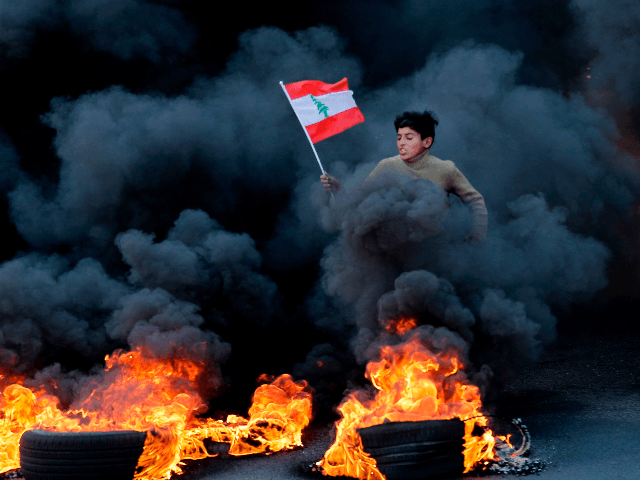Lebanese security forces detained at least a hundred demonstrators on Thursday as Lebanon’s long-running but mostly peaceful anti-government protests turned violent for the second night in a row. Dozens of people were reportedly injured in clashes with the police.
Protests against government corruption have been vigorous but largely non-violent since they began three months ago. Demonstrations tapered off a few weeks ago but returned with a vengeance on Tuesday near Lebanon’s central bank, which angered the protesters by imposing controls on foreign currency. Streets were blocked and the windows of banks and currency exchanges were smashed.
The Associated Press speculated on Tuesday that the protests subsided due to the holiday season, apprehension over mounting tensions between the United States and Iran, and the fact that Lebanon finally got a new prime minister in the middle of December.
The streets erupted again this week because Prime Minister Hassan Diab has been unable to form a government, currency controls were imposed, foreign currency stopped flowing into the country, a debt-swap plan fell apart, and the police began arresting demonstrators for murky reasons, leading to exchanges of thrown rocks and tear gas.
Security officials said the situation on the streets escalated when “vandals” began attacking security forces and “trying to force their way inside” the central bank. Demonstrations have already been held outside Prime Minister Diab’s home demanding his resignation.
“Panic has set in among residents who fear their deposits are in danger. Protests have taken place inside commercial banks over the last few weeks as depositors tried to access their accounts,” the AP reported.
The week began with vows of renewed demonstrations by protest organizers fed up with their government’s inability to cope with the grinding economic crisis. “We’ve gone back to closing down roads because we can’t stand it anymore. What we earn today is not enough to buy the basics for home,” one irate citizen told AFP.
A group of lawyers defending the protesters said the number of detentions reached 101 on Wednesday and described the situation as “madness.” Further demonstrations were planned on Thursday to demand the release of the detainees.
United Nations envoy to Lebanon Jan Kubis criticized the Lebanese political class on Wednesday, telling them to blame themselves for the “dangerous chaos” instead of blaming people angry about their “free-falling economy.”
In the course of quoting Kubis’ remarks, Deutsche Welle noted that one major complaint of the protesters is that ordinary people cannot get their money out of the banks, but “politicians, senior civil servants, and financiers” were able to transfer their money abroad for safekeeping while the Lebanese financial system collapsed.
On Wednesday, acting Finance Minister Ali Hassan Khalil gave assurances that Lebanon is “on the doorstep of forming a new government.” He promised a new cabinet with 18 “specialist ministers” who could implement the reforms necessary to persuade donor countries to resume financial support.
Haaretz on Thursday explained how Lebanon’s debt problem was created and why it appears so intractable:
Lebanon’s deep problem is a government that basically serves as a spoils system for the country’s leaders. That has been the source for the anger that has led to months of protests and, just as importantly, why the government has refused to give in. The elite have too much to lose by reform.
It’s a standoff that the country cannot afford. Lebanon is deep in the red: its debt is 155% or more of gross domestic product, one of the highest ratios in the world. It has been able to stay afloat financially in recent years only by coaxing Lebanese expatriates to deposit dollars in local banks by paying exorbitantly high rates of interest. But the system has collapsed in the face of protests, government paralysis and fears that the country will not be able to service its debt for much longer.
The great fear outlined by Haaretz is that while Lebanon’s elite squabble over divvying up the spoils of the deflating national treasury, the middle class is beginning an exodus that could become a full-blown stampede if a debt default crashes the banking system.
This would deprive Lebanon of both the skill base it needs to recover from the crisis and the “Westernized” Lebanese who have been keeping the country from collapsing into an Islamist hellhole dominated by Hezbollah terrorists and their masters in Iran – a bitter end for a protest movement that began with spirited demands for Hezbollah and Iran to lose their grip on power in Lebanon.

COMMENTS
Please let us know if you're having issues with commenting.